Vladimir Kramnik has had a wildly uneven 2013, swinging from the highs of the Candidates Tournament and Dortmund to an abject last place at the Tal Memorial. The Alekhine Memorial was merely disappointing, and afterwards he gave a long interview to a popular Russian weekly magazine.
The wide-ranging interview with Natalia Skurenok for Itogi is aimed at a general audience rather than solely chess fans – the title they gave it might be translated as “Brainbox!” (literally, “head”). Topics include Kramnik’s style of play, the effects of age, negotiations for a match with Bobby Fischer, money in chess and the advantages of not speaking French in France!
Vladimir. You played excellently in the St. Petersburg leg of the Alekhine Memorial, but you weren’t among the winners. Why not?
This season has been tough for me. I put everything into the Candidates Tournament that preceded it. By the start of the Alekhine Memorial I could already feel that I wasn’t in optimum form, and it was also a very impressive line-up – Anand, Aronian, Gelfand.
You’ve reached dizzy heights in the chess world. What do you play for now?
For interest and the game. I’m not a vain man and I’ve never been excessively ambitious. It’s more that I’m a perfectionist. I want to do what I do as well as possible. And I like the game itself, the creative element. I enjoy it, but I don’t have any sporting aggression. Kasparov, for example, not to mention Fischer, was always driven above all else to win. I’m more fascinated by the process.
At the Alekhine Memorial you played two seven-hour games in two days! Despite that you remained stunningly calm. Does winning or losing make no difference to you?
There’s a difference, but it’s very short-lived. Perhaps it sounds banal, but my motto is – do what you have to, and what will be will be. A lot in chess also depends on luck. Somehow it’s connected to a higher power, or perhaps that’s just Russian fatalism. It might be because I’ve never been fixated on the result that I’ve always played quite calmly. When I understand I’ve done my best I don’t get overly upset, even if I lose.
It seems that was why Kasparov described your style as pragmatic, solid. But how would you describe your style?
He said that when he lost to me and was seething with powerful emotions. Until then he always spoke enthusiastically about my play. For me every player is pragmatic, because they take advantage of their strengths. My style is quite difficult to define. Chess, after all, is a form of creativity, like painting and music. Can you clearly define the style of an artist or musician? Signature traits, yes, those are visible, but they can change over the years, while a style… I’m drawn more towards positional, strategic play rather than tactics. It’s been that way for me since childhood. Kasparov’s style is that of a brilliant tactician – he plays aggressively and is strong when he’s on the attack. But he doesn’t play like that because he wants to delight the spectators but out of the same pragmatism, because he wants to win. My strength is positional play, gradually outplaying my opponent.
Who raised you as a chess player?
The very first chess book I read was written by Anatoly Karpov – at the time he was the World Champion and the whole country was talking about him. Bookshops in Tuapse sold nothing on chess other than his books and my father bought them for me. Then I attended the Botvinnik-Kasparov School. My style is probably somewhere between Karpov and Kasparov, with elements of both. In general it ended up being a mix.
Is it true that you would run outside to play chess with adults?
Yes, I’d occasionally play in the park. In Tuapse we had the right climate – warm, the sea nearby. But I rapidly outgrew that level and was no longer interested in such games. Then when I turned 18 I had to move to Moscow, because it was hard to keep travelling to tournaments from Tuapse. The nearest airport was a four hour drive away and in winter they often cancelled flights due to fog.
Why didn’t you graduate from university?
I didn’t even enrol. By the time I finished school I was already in the national team and the world top ten. Combining chess at that level with studying at university is impossible. It would have been possible to do it just for show, but I wouldn’t have been able to study normally in any case. Graduating from university just to have a diploma doesn’t interest me, and the kind of education I might have got, for example, at the Institute of Physical Culture, is what I essentially acquired anyway.
Does age affect the quality of play?
It does. The quality of my play now is by no means worse than before, but as the years go by your speed drops slightly. I think it’s pure physiology, and with age some things are lost irrevocably. As far as I can see, however, our understanding of the brain is still at a primitive level and it’s impossible to monitor those processes from the outside. Recovering after a game has become a problem – I now need more time for that, especially as I’ve got a family and children who demand time and attention. For example, we play nine days in a row, nine games: in order to compensate for the age difference between myself and the majority of my rivals I need to do more work and be more professional in eating and physical training. It was in the past – when the pace was different, there were no computers and you could adjourn a game until the following day – that chess players would play on until an advanced age – Mark Taimanov, Mikhail Botvinnik, Viktor Korchnoi. Now everything’s decided in one sitting and a game can last seven hours.
Hockey and figure skating draw crowds that fill stadiums because there’s a spectacle. But is chess beautiful?
You only begin to appreciate the beauty of chess when you’ve reached a certain level of play and, in general, you have to have some kind of predisposition towards intellectual pursuits. Perhaps I’m something of a freak in this regard, but intellectual effort gives me enormous pleasure. I need to keep my brain occupied – I love solving mathematical puzzles. When I have free time my favourite activity is to search the internet for some articles on economics and science. I think if it wasn’t for chess my life would involve science, mathematics and economics. I like that kind of thing. In contrast to many people who have a problem engaging their brain my problem is the opposite – switching off – it’s the same for all chess players.
How do you relax?
During a tournament – not at all. It’s a very tough regime with constant tension. After a tournament I spend a week simply catching up on sleep, if possible. For me being at home is the very best way to rest, and not trips to holiday resorts. My children, who I don’t see so often, are a great pleasure. And if they let me get some sleep then everything’s wonderful. I also meet people less, particularly in the first few days after a tournament: best of all is to retreat into your den and have no plans at all.
Do chess players have some kind of special diet?
The approach to food is important for chess players and you have to pay attention to it. For example, sugar is, of course, absolutely necessary, as during a game we burn a lot of it. White sugar gives a quick burst of energy, but that peak soon abates, which is dangerous during long games. More useful is the sugar you find in dried fruit – in dried apricots or raisins. If you’re sure that a game will soon end then for a rapid effect you can eat white sugar or drink coffee. That lasts for about 15 minutes, then there’s a slump, and if the game hasn’t finished by that time your concentration level will drop.
A lot has been said recently about how super-computers will put an end to chess. Is chess really finite?
It’s finite, no doubt, but it’s a number with 27 or 28 zeros – for the human mind it’s still infinite. Checkers, and particularly Russian checkers, really has been exhausted by computers, if you can put it like that. Chess is too complex: even the most powerful computers we use to train can analyse positions to a maximum of about 30 moves ahead. Games, meanwhile, can sometimes stretch to 200 moves. Yes, computers are strong, but they don’t calculate the game to the end and sometimes they make mistakes.
You actually competed against a computer and started off leading but finally drew. Kasparov once lost!
He lost more due to carelessness, because at that point computers were much weaker. Back then he just collapsed, as he began to imagine that someone was helping the computer. He was clearly stronger than the machine, and if he’d been more mentally stable he’d have beaten the computer. I played a few years later against a much more powerful machine. After the first half of the match I was leading by two points, but then I lost two games in a row. It was probably tiredness: when you play against a machine you have to maintain fantastic concentration, much greater than against a human being – the machine never gets tired! In the end it was a 4:4 draw. In 2006 it was almost impossible to beat the machines as they were already very powerful. The most you could hope for was to draw, which I was close to doing. Since then computers have moved far ahead and such a match no longer has any sporting interest. A human being is doomed to lose.
Kramnik lost the 2006 match 4:2 after famously overlooking mate-in-one in the following position | photo: ChessBase
You were once accused of using computer help. Do you recall that match in 2006 in Elista?
Those accusations were totally absurd! In Elista there were extremely strict anti-computer measures – before the games we were fully scanned just as you are when boarding a plane. A jammer was even set up which suppressed radio signals within a kilometre radius. It was simply that after a bad start my opponent Veselin Topalov tried to provoke a scandal and bring an end to the match. Fortunately he didn’t succeed.
Can you play without looking at the board?
All professionals can. We even had a tournament like that which was held for many years. It’s the same for musicians – they don’t need to look at the music. But playing a lot of games simultaneously, more than ten, requires special training – the record was 62 games. Up to ten is possible for any top player. At the start of the last century blindfold displays were very popular and you could earn money from then. Alekhine himself often took part in such events, and it seems they didn’t pay at all badly. But it’s a very serious burden on your nervous system.
Many sports have business sponsors. Is chess supported somehow?
Yes. For example, the Alekhine Memorial was sponsored by Gennady Timchenko and Andrey Filatov, his business partner. The sponsors of our chess federation include Gazprom.
Among government figures who, apart from Arkady Dvorkovich, is hooked on chess?
Alexander Dmitriyevich Zhukov is a good player, almost a professional. He was the Russian Chess Federation President for many years before he handed over the reins to Dvorkovich, while his own focus switched to Sochi. He still comes along to tournaments, however, and sometimes we play blitz – he loves a challenge.
In recent decades due to a combination of factors the intellect has ceased to be valued in Russia. Does the fact that major figures in business and power are starting to support chess mean that the government is remembering “higher matters”?
It’s quite possible, as serious attention is now being paid to chess. In recent years talented Russian children have started to receive scholarships. I got my first financial support from the Russian Chess Federation in 2007, despite having started to play for the team in 1992. Up until that point I paid for all my preparation out of prize money. Therefore when they started to pay me to prepare and hire a trainer it was almost a culture shock. Recently the preparation of myself and other Russian players for the tournament in London was paid for. That’s a very expensive luxury. For example, if I’d paid out of my own pocket then after taxes and preparation I’d have lost money overall even if I took first prize in the Candidates Tournament.
What will you do when you quit chess?
I’ll come up with something as I’ve got a lot of friends and contacts. I’m sure I’ll find an interesting occupation, and it doesn’t have to be in the chess world. That doesn’t bother me at all.
Marie-Laure, your wife, is a journalist?
Yes, though now you could say a former journalist.
Let me guess – you got acquainted during an interview?
Exactly! A classic of the genre. She was working for Figaro in the “debate and opinions” editorial department, and was the only person there who had any idea about chess as she’d played as a child. So if they needed to write about chess they’d send her. When I beat Kasparov they sent her to interview me. Moreover, she knew some of my chess-playing friends and was to some degree familiar with the chess world. Now, after the birth of our children, she’s no longer sure she wants to return to work. Plus the pay isn’t great given the volume of work: she would work 6 days a week for 8 hours and sometimes they’d call her in at the weekends or in the evenings. By the way, I subscribed to Itogi for three or four years when my wife was working for Figaro: they allowed her to subscribe to a foreign publication for her work and we chose Itogi. Then my wife left the newspaper and unfortunately your magazine isn’t sold in Parisian kiosks.
Kramnik with his wife and daughter at the opening ceremony of the Alekhine Memorial in Paris | photo: www.alekhine-memorial.com
Can you support your family yourself? After all, chess doesn’t involve the same kind of money as football.
Compared to football it’s not much, of course, but it’s pretty decent. Of course it all depends on your needs – for example, I’ve got no need for private yachts or planes, while for everything else there’s plenty. For World Championship matches in particular the prize funds are very decent, and I’ve already played in four. In financial terms I’m comfortable now. I think among the non-Olympic sports chess would be in first place, if you don’t count golf. Of course by the standards of Moscow business we’re down-and-outs, but in European terms we’re perfectly well-off people. If only it wasn’t necessary to pay such enormous taxes in France!
You pay taxes in France?
Unfortunately. If I could choose I’d pay in Russia, especially as I’m a Russian citizen.
So copy the example of Depardieu!
Depardieu has grown-up children and is now officially single, so he can do what he wants, while I have a family living in France and a daughter who’s just started attending school. Therefore while my family is there I’ll pay taxes in France. Perhaps we’ll move, which is a possibility we’ve already discussed – but not because of taxes. While the children are young it’s more convenient for my wife to live in France, closer to her relatives. If later I end up working in another country we might move.
Do you speak French well?
I barely speak at all. Of course I’m a little embarrassed about that, but I don’t have any great urge to learn. There are advantages to not speaking French, and my wife and I talk in English.
But it always seemed to me that the French frown when they hear English?!
Not any longer! That’s how it was before, but now, particularly in the centre of Paris, it’s all very different. Of course I can make myself understood in a restaurant or shop, but in my social circle everyone speaks either English or Russian. My wife and I speak English – you might say we met in English. She’s learning Russian and speaks a little. I speak Russian to my daughter although her Russian isn’t very good yet and we’ve hired a Russian nanny. It wouldn’t be difficult for me to switch to French as I understand a lot, but it would require a few months in a row learning it while I spend almost all my time travelling – tournament after tournament, different events. There are a lot of pluses, though: where we live, for example, the talkative concierge knows that I don’t speak French and directs all questions to my wife. And with workers and plumbers – I only have to say “bonjour, bonjour” to them and they realise I don’t speak French, so no-one bothers me.
Convenient! But after all the French are very sociable and talkative, and that means you’re limiting your ability to talk to people…
Of course I love meeting people, but only those I choose myself. In France, meanwhile, it’s typical that if you go to a café and order coffee you find the waiter starting to chat to you – he’ll ask you something, you’ll respond. From a psychological point of view that’s good, but I don’t have any such requirement. It’s convenient for me: “nicht verstehen” – and I can get on with my own business.
Do you meet with Boris Spassky in Paris?
Not much recently, as he moved to Russia. I was hoping to see him at the Alekhine Memorial, but he didn’t come. He has problems with his health at the moment – he’s recovering from a stroke.
Did he talk to you about that famous match against Fischer? At the time chess was almost a national idea in the USSR, and then some American took on and crushed a Soviet grandmaster!
For professional chess players it was an expected defeat – Fischer was hard to stop. Perhaps it was fated to be that it was his best period, the peak of his form, and it was very tough to compete with him. The rest were lucky that after that match he quit chess, as otherwise he’d have kept winning for years to come. It seems, however, he had mental problems.
Did you know Fischer?
His representatives approached me around two years before his death. We began negotiations for a match – it seems he’d decided to play again and I was the reigning World Champion. He was already over 60, and of course he’d lost some of his skills, but it was nevertheless interesting for me to play against a legend. My friend Joel Lautier, a well-known French player who incidentally now lives in Russia, travelled to Fischer as my representative in order to conclude the negotiations. They talked for two days. Fischer was constantly undecided and it seems he was looking for a somewhat weaker opponent – he even wanted to play against the Women’s World Champion. Ultimately he decided against it and I never did get to meet him. Soon afterwards he died.
How do you make acquaintances in general? For example, Natalia Vodianova – did she approach you herself?
It was simply that Justin, her English ex-husband, is a great chess fan. They once came to a chess tournament and we met there. We continue to meet now, especially as Natalia is often in Paris where she spends a lot of time. She comes to visit us and we’ve got mutual friends.
Russian model Natalia Vodianova made the opening move of game 13 of the Kramnik-Leko match in 2004 | photo: Evgeny Atarov
Does she understand chess?
Not particularly, but she really wants to teach her oldest son. The boy already plays, and not badly, by the way. She asked me to find him a good teacher.
Perhaps you’ll practice a little with other people’s children and then teach your own?
I’ll teach my own anyway, and moreover I never have enough time to work with my daughter.
She’s still very young! Are you dreaming of making the girl into a Champion?
Absolutely not! I simply think it’s very useful for general development, for the brain: four and a half is an excellent age. I started myself when I was five. It’s precisely at that age that chess is good for brain development.
I remember when I learned to play chess in my childhood I was terribly afraid that the pieces would eat me!
My daughter has the same attitude to chess! I’m teaching her at the moment and she still doesn’t grasp the essence of the game, but taking pieces – that’s something she understands. I set up a position to show her how the pieces move and right away it’s “yum, yum – take that! – and I can eat this as well!”
What does chess actually train – memory, tactical thinking?
Chess is the same as a gym for your body: you’re keeping your mind in shape and there’s nothing mystical about it. It also develops memory and logical thinking. You train the muscle known as the brain. For children chess is also good because it has elements of a game. Simply solving mathematical puzzles quickly gets tiring and is boring for children. Chess also teaches people to take responsibility for their decisions – afterwards there’s no-one else you can make a scapegoat for your defeat. We shouldn’t forget about developing logical thinking – you start to calculate ahead and evaluate the consequences of your actions. That’s enormously useful for a child’s overall development.
Did your friendship with the Klitschko brothers also develop from chess?
Yes, they both play decent chess, and our friendship started at a tournament. They’re cultured, intelligent people and the anecdotal image of boxers doesn’t apply to them. They play well for amateurs.
And did they teach you to box?
No, but I’ve been to their fights and they always invite me. A year ago Vitali and I ended up at a training camp at the same time – he had a month-long session before a fight while I had the same before a tournament, and we decided to combine them. I watched his training sessions and in the evening I gave him some chess lessons after dinner. Both brothers have excellent minds – they could easily be chess players. By the way, Lewis and even Tyson were also far from stupid people.
Kramnik takes on Vitali Klitschko at their joint training camp | photo: KMG / Klitschko press-service
Do you play any sports apart from chess yourself?
It does me good to swim, though I find it very boring – I hate it, but I swim because I have to. By the way, swimming pools are very convenient for thinking: you swim for an hour or an hour and a half and solve some problem. Unfortunately the sports I like – tennis and football – are inadvisable for me because of back problems.
Do you know any jokes about chess players?
I can’t recall a single one – perhaps we’re truly respected?
If you’re respected then perhaps you should throw yourself into politics? Kasparov did that.
No, as a profession that’s not for me. Politics is for those who need the spotlight and applause, with rare exceptions. And Garry Kasparov loves that. But I have no need to be admired. I’m not power-hungry and I’ve got no interest in controlling others. I’m more interested in social projects – doing something from the ground up. Speaking and waiting an ovation isn’t for me.
Your whole family is connected with art – your mother graduated from a conservatory and your father draws. What about you?
My brother Evgeny also has an advertising agency and deals with outdoor advertising. My father and uncle are artists. I tried drawing, but it was absolutely awful. Nature completely turned its back on me there. My father has a big library of art books and I enjoy looking through them. I visit museums. I love music and have a lot of musician friends and often go to their concerts, especially when friends come to Paris. I’m friends with Vadim Repin and we often meet. Vadim and Nikolai Lugansky played at the opening of the Alekhine Memorial in the Louvre. I love to go to their concerts. But as for engaging in art – when I quit chess after forty I’ll learn everything and catch up on it all.

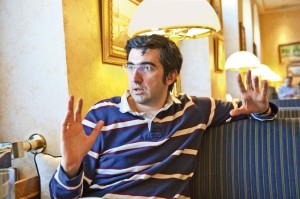
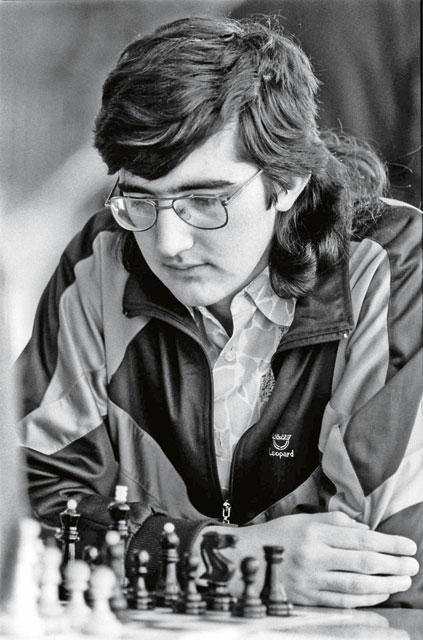
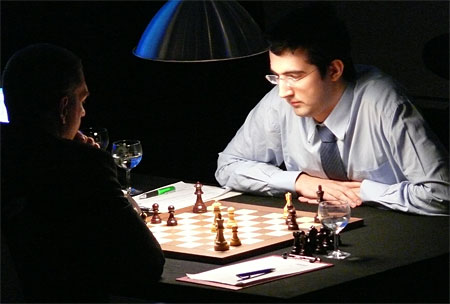
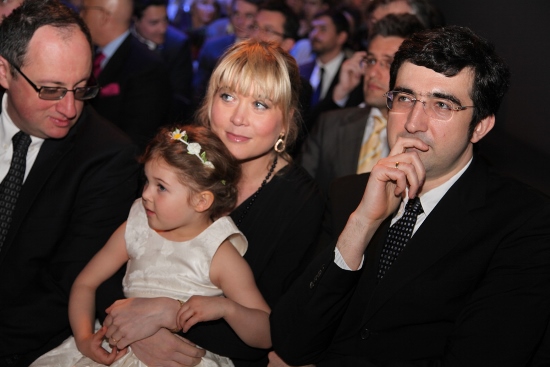
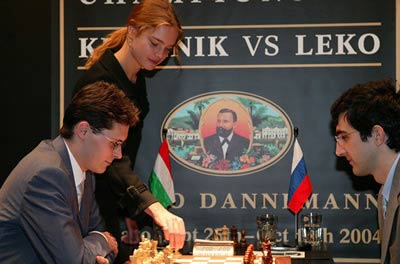
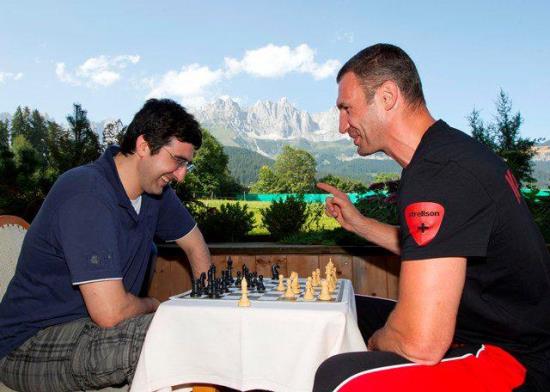

Thank you so much for keeping your site alive. Always a treat to read those articles you translate.
Finally another bone but tasty nonetheless :)
Kramnik always gives excellent interviews !
Thank you so much for translating this article.
I can’t help but wonder how many interesting russian articles concerning chess we don’t get the chance to read.
Very grateful for this one however. Kramnik is an intruiging individual.
Thank you so much for the awesome article, and thank you also for the nice edition. It is always a pleasure to read chess articles with good photos and well structured.
Congratulations and keep the good job :)
David Kaufmann
This post is a valuable addition to the conversation—thank you!